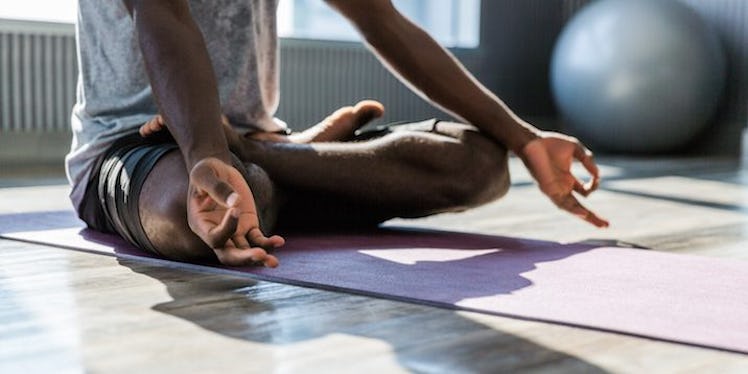
This Is The One Skill Every Student Athlete Needs To Master This Summer
Let me paint a picture for you.
Imagine a quiet yoga studio packed full of big, sweaty, college football players. Their eyes are closed, and they're breathing deeply in tree pose.
During my last semester of my senior year of college, this picture was my reality. Two mornings a week, I would wake up early and go teach the Marist College football team how to transition from dead lifts to downward dog (literally though -- my class was right after their lifts).
As both a journalism graduate and yoga teacher, I always knew I wanted to incorporate yoga and meditation into my senior thesis. So, I decided to research how meditation affects the mentality and communication skills of college athletes.
Apparently, I wasn't alone in my curiosity.
A form of meditation, called mindfulness training, is on the rise, and it's especially effective for student athletes.
According to the University of Miami, mindfulness training teaches participants to focus their attention on the present moment and observe their thoughts and feelings without emotional reactivity.
Relaxation training, on the other hand, refers to any method that helps achieve a state of increased calmness, reduced levels of pain, anxiety, stress, or anger (think meditation and yoga classes).
Both practices have an array of positive benefits, but recently, mindfulness training has found its way into the regimen of student athletes, who typically grapple with an intense workload on top of their strenuous conditioning programs.
People are beginning to realize the mind requires just as much exercise as the body, if not even more.
A recent study led by Joshua Rooks , a University of Miami psychology PhD candidate and former football player for Northwestern University, measured the attention and emotional well-being of student athletes, using both mindfulness training and relaxation training.
After four weeks, Rooks found that mindfulness training was more effective when it came to increasing the attention span of student athletes.
Compared to my own study, Rooks' findings definitely lined up: In my experience, I saw little change in the mentality of my football players after they received consistent relaxation training. Perhaps, as Rooks found, they would have benefited more from mindfulness training.
So, what's the hold-up? Shouldn't every team dive right into mindfulness as a supplement to their physical exercise?
Maybe, but with all the focus and hype on meditation and mindfulness in general, people should be cautious before exploring these practices.
Elite Daily spoke with Dr. Jeffrey B. Rubin, psychotherapist and author of The Art of Flourishing, to get his thoughts on the effectiveness of mindfulness training in general, and more specifically, with student athletes.
He tells us,
Mindfulness can be helpful [to both] because it cultivates heightened focus and concentration, lessens self-judgment, and fosters greater equanimity. A regular practice that is built into [an athlete's] life will be more helpful than a more sporadic practice.
Dr. Rubin also linked us to one of his articles, entitled The Shadow Side of the Mindfulness Revolution, in which he stressed that mindfulness and meditation shouldn't be used as band-aids for any personal problems or emotional trauma, because in the end, these problems will only creep back up.
Still, the experts tell us and the studies show that mindfulness training, when done correctly, can be extremely beneficial for just about anyone -- especially student athletes, who are under an increased amount of demand and stress.
It's kind of weird that we don't think of the brain as a muscle that needs to be exercised just as much as our biceps.
But apparently, the brain is the new bicep, so start exercising! Doctor's orders.
Citations: Building Mental Toughness Off the Field (University of Miami), The McMindfulness Craze: The Shadow Side of the Mindfulness Revolution (Truthout)